Having the ability to group things and make sense of the world around us brings a sense of order to our lives and helps us find direction. In order to put things in groups the first thing you need to do is find likenesses and differences in the items that you are classifying. It is often easiest to start with the things that the items have in common. The worksheets will help prompt students to find definable characteristics that can express what the items you a grouping have in common and differ by. We will explore by to use charts to express these grouping procedures. We will also explore how this can be extended to the concept of pedigree charts and basic genetics. The worksheets include heavy use of Venn Diagrams to help students find likenesses and differences between organisms.
Print Sorting Worksheets
Click the buttons to print each worksheet and associated answer key.

Sorting 3 Characteristics into Venn Diagrams
Since they are not triangles and they are not red shapes they are not shown in the Venn diagram.

Using Triple Venn Diagrams
The big red triangle belongs in all three categories so it is placed where all the circles overlap. Now complete the other Venn diagrams.

A Little Help Student Worksheet
This goes along with the other 2 worksheets. This sorting worksheet makes it easier to follow along.

Sorting 3 Traits Worksheet
Put these bad boys to work. You will analyze what is given to you and arrange them in the way that makes the most sense for you.


Sorting 5 Characteristics
A lesson on puppy dogs. You can sort the breeds of dogs in lots of ways. See how far this one will go for you.


Arrange These Pups
You are given a series of 10 breeds of pups. You need to create a system that finds like and differences between them.


African Animal Sort
You can sort the African animals in lots of ways. We work off of pattern coats, the presence of hooves, neck size, and the presence of horns or antlers.

7 Characteristics - With a Little Help
This worksheet gives you a bunch of different examples to get you started and headed down the right path.


7 Traits
In this example we can sort these animals in 7 ways: 1) long or short neck; 2) pattern or plain coat; 3) carnivore or herbivore; 4) can or cannot live in water; 5) antler/horn or no antler/horn; 6) hooves or paws; and 7) long or short legs. We will sort the animals using Venn diagrams.


Double Sort - How It's Done
Look at these 10 pictures. Do you notice any similarities among them? They are all nature pictures but there are two types of pictures, flowers and insects.

Double Sorting - On Your Own
Double sort these pictures into categories. This is a great skill to have and students may need some help, at first.

Doubles - With a Little Help
Look at these 10 pictures. Do you notice any similarities among them? They are all pictures of everyday objects but there are two types of pictures, chairs and kitchen things. Now double sort the items into the diagram.
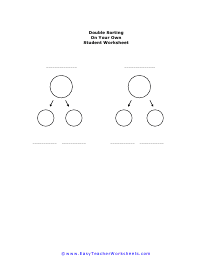
On Your Own Student Worksheet
Create your own outline using all of the skills we have been exploring.



On Your Own
This worksheet will require you to read and see through everything that is in front of you.

Define Your Own Characteristics
There are 10 nature pictures and you are asked to sort these pictures into categories of your choice. How many ways can you think of to sort these pictures? You don't need to include all the pictures in every sorting.
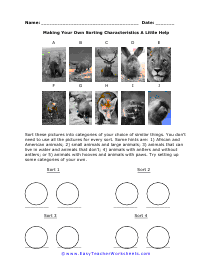
Rearrange Pictures
Sort these pictures into categories of your choice of similar things. You don't need to use all the pictures for every sort.

Completely On Your Own
Sort these pictures into categories of your choice of similar things. You don't need to use all the pictures for every sort.

Student Sorting Sheet
Sort any group into two different categories. Take your time and put everything in the right slot.
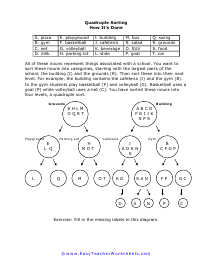
Quadruple Sorting
All of these nouns represent things associated with a school. You want to sort these nouns into categories, starting with the largest parts of the school, the building (I) and the grounds (R).

Quadruples - A Little Help
All of these nouns represent things associated with flying. You want to sort these nouns into categories, starting with the airplane and the atmosphere it flies in.

Represent Things
All of these nouns represent things associated with a shopping center. Sort these nouns into categories based upon your own judgment.

Quintuple Sorting
A quintuple sort divides items into categories at five levels. If five levels of sorting seem like a lot of detail, this example will show you that five levels of complexity is common in everyday life.
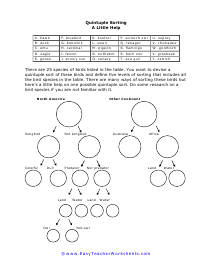
Heavy Moves
There are 25 species of birds listed in the table. You want to devise a quintuple sort of these birds and define five levels of sorting that includes all the bird species in the table.
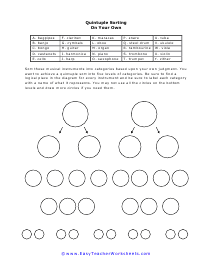
Musical Instruments
Sort these musical instruments into categories based upon your own judgment. You want to achieve a quintuple sort into five levels of categories.
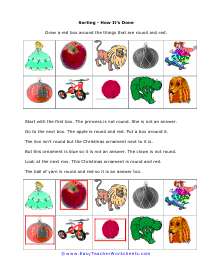

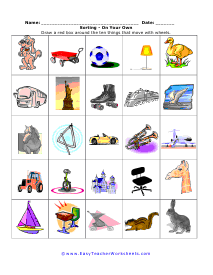

Simple Sorts
Look at the pictures and sort them into 2 groups as given in the table at the bottom. Write each object's name under one part of the table.

Simple Groups
Look at the pictures and sort them into 1 group as given in the table at the bottom. Write each object's name under one part of the table.

Practice the Skill
Look at the pictures and sort them into 4 groups as given in the table at the bottom. Write each object's name under one part of the table.
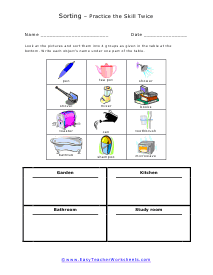
4 Groups
Look at the pictures and sort them into 4 groups as given in the table at the bottom. Write each object's name under one part of the table.
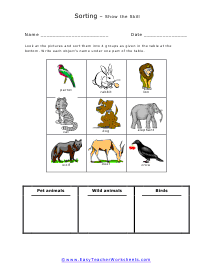
4 Groups of Sure
Look at the pictures and sort them into 4 groups as given in the table at the bottom. Write each object's name under one part of the table.
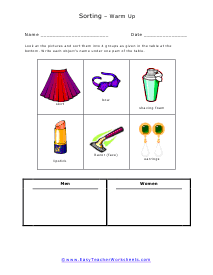
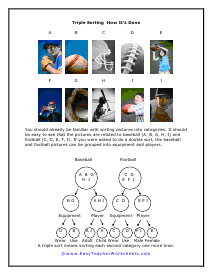
Triple Sorting
You should already be familiar with sorting pictures into categories. It should be easy to see that the pictures are related to baseball (A, B, G, H, J) and football (C, D, E, F, I).

Triple Check
You want to triple sort the items in these 10 pictures. This means that you must find similarities among smaller and smaller groups of items.
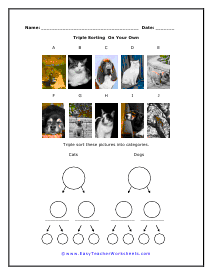

Sorting 3 Characteristics
Sort the shapes into the Venn diagram. The triangles are placed in the left circle and the octagons are placed in the right circle.
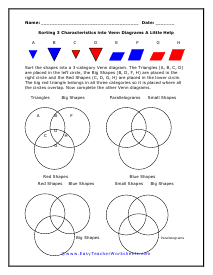
Sorting 3 Shapes
Sort the shapes into a 3-category Venn diagram. The Triangles (A, B, C, D) are placed in the left circle, the Big Shapes (B, D, F, H) are placed in the right circle and the Red Shapes (C, D, G, H) are placed in the lower circle.
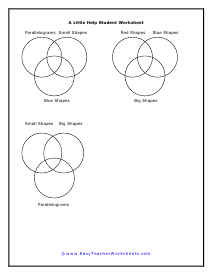
Student Helper
Shapes and Venn Diagrams... It's ironic. This worksheet goes with the two that found just above.
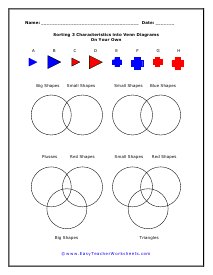

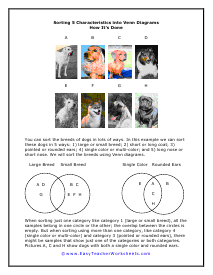
Sorting 5 Characteristics
We work with puppy dogs again, but this time we are really going after how they differ.

Sort 5 with Help
You will put everything you have learned so far to do a mega comparison of many different variables.
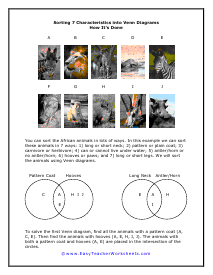
Sorting 7 Things
This is a helpful sheet that helps you learn how to differentiate 7 things between animals.
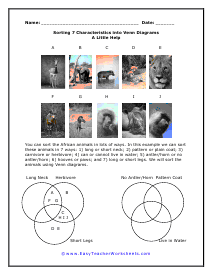
7 Traits to Set Out
I think a good start is where do they live? You can then work of that set trait.
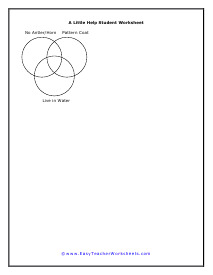
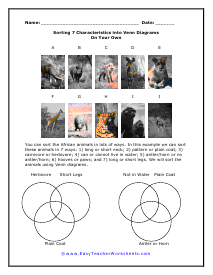
7 Into Sets
This is an upper level worksheet that requires you to break things into 7 groups. There are a bunch of ways to get at this, but we suggest: Herbivore, Short Legs, Not in Water, Plain Coat, Antler, or Horns.
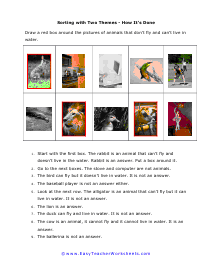
Sorting with Two Themes
You will work with pictures of animals that don't fly and can't live in water. You decide where it goes from here.
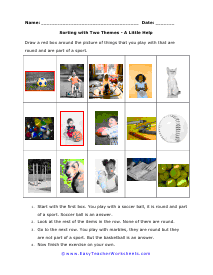
Round and Sports
Draw a around the picture of things that you play with that are round and are part of a sport.
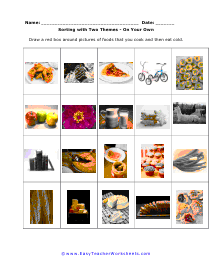
Cook or Eat Cold
You will be given a series of different foods and decided if they need to be cooked or if they can be eaten cold.
Why Sorting Skills Are Important for Children
By age 4, most children have an inherent ability to sort objects depending on color, shape, and size. Sorting appeals to children because it helps them bring order and make sense of their surroundings. While it's a fun activity, it improves a child's cognitive abilities.
Sorting skills are important for children because they help them focus on details, think critically, and develop problem-solving skills. The ability to notice similarities and differences promotes reasoning and makes a child good in numbers and daily choices.
When you first identify these characteristics the differences between them will often present themselves more vividly. We find that students quickly get the hang of this through experience. We would encourage students to review this skill often throughout the course of the year by simply having students perform activities like you will find below in these worksheets. A great way to do this with students is to create sorting bins and start out really general. I often start teaching it with numbers 0-9 in a pile and 10-19 in another. Then I progress to colors and shapes. Starting out simple is the best way to get this skill going in their minds.
How Do Sorting Skills Benefit Children?
Sorting is the foundation of learning numbers. Before a child can learn addition or subtraction, they need to understand what they are dealing with first.
Sorting skills benefit children by helping a child's brain process information about how items appear and relate to each other. While exploring objects, children learn to identify patterns and relationships, which make them attentive to details.
So, as kids learn to sort things, they become more observant and can develop a language to explain the attributes of something.
Grouping items according to similarities helps children apply reasoning skills and express why an object fits into a given class. Also, the process requires decision-making skills when two or more attributes are involved.
In a nutshell, sorting skills help a child to:
- Compare items and notice similarities and differences
- Organize and match items depending on their attributes
- Understand relationships and make patterns
Whatever a child learns in the process will later help them in other tasks. When they encounter a situation that requires the intelligence learned, they use it to make informed judgments and decisions.
Is There Any Influence a Child's Academic Performance?
Sciences and particularly mathematics are challenging to most children. However, research shows children who learn cognitive skills before formal schooling perform well through their elementary studies.
Sorting skills can influence a child’s academic performance. From age 3, the child's brain is active, competent, and cognitive, and it is the best time to introduce sorting skills. Through comparing and grouping, children learn critical thinking, the building block of solving academic problems.
Learning to identify and sort objects gives children a positive attitude towards learning, making it easy for them to understand concepts because they already have skills to build on. As learning advances, children develop executive functions which boost their performance, including:
- Shifting
- Updating
- Impulse setting
- Goal setting
How To Introduce Sorting Skills in Children
You should make sorting fun and engaging when introducing it to a child. What you should first consider is the age of the child. For children aged 4 and 5, you can use three or four categories of sorting, and for younger ones, two.
You consider age because simple sorting activities may be less interesting for older children while too complex ones may be challenging for younger children. Then you'll need to select sorting items that children interact with daily to make the activity relatable.
Examples of items you can use in sorting are:
- Crayons
- Pompoms
- Playing cards
- Toys
- Laundry
- Socks
- Marshmallows
- Natural items such as pebbles, flowers, and leaves
To set the pace for a young child:
- Sort whatever item you choose in terms of shape, color, or size.
- Allow them to repeat the process while explaining why they group items in a particular way.
- Make the process habitual and advance to mathematical exercises such as making patterns and matching
Final Thoughts
Sorting is a fun activity that lays a good foundation for learning in children. As children classify objects, they develop:
- Reasoning skills
- Observation skills
- Critical thinking skills
- Problem-solving skills
- Decision-making skills
These skills set up a child for success with numbers and other academic studies. The earlier you introduce sorting to your child, the better.


